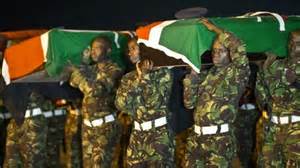 Yesterday I showed you a picture of the Kenyan flag being raised at the school at Othoro. Here is a picture of the Kenyan flag on the caskets of soldiers killed by El Shabab. I wrote about the dirty little war that is being fought in East Africa when we came back from Wamba. Kenyans are reacting to attacks inside their country aimed at Christians.
Yesterday I showed you a picture of the Kenyan flag being raised at the school at Othoro. Here is a picture of the Kenyan flag on the caskets of soldiers killed by El Shabab. I wrote about the dirty little war that is being fought in East Africa when we came back from Wamba. Kenyans are reacting to attacks inside their country aimed at Christians.
Real world crisis and attacks, physical and mental bring the temptation to back off of witness and mercy. There are temptations all around to “just get along”, as Rodney King famously said. The problem is we are baptized for this moment to witness to Christ in Word and deed. A Theologian by the name of Jurgen Moltmann came up with what he called a “Theology of Hope”. It is fascinating because it takes seriously God’s statement that He wants to give us a future and a hope (Jeremiah 29). It has major difficulties in that it does away with the “two Kingdoms” which many think is a good thing, and does not seem to take original sin serious enough. There is a hippy like “take it to the streets” quality about it that reminds me of Bernie Sanders which is why I went back and read some of his stuff. I was struck powerfully with these words from Moltmann’s treatise called “the Crucified God.”
“Temptation teaches us to pay heed to the Word,’ said Luther. These temptations can be suffered passively, where, as in Luther’s hymn, sin, hell and death swallow man up and human existence is called into question. But temptations are much more often actively suffered. A man’s mettle is tried only in the front line, not back at base, even supposing that the sufferings of others do not leave him in peace there. But in the front line, he is put to the test because he is struggling to do his utmost; the more he tries, the more he is tried. Anyone who does not put himself to the test is hardly tried or tested at all. Only when, with all the
understanding and consistency he possesses, a man follows Christ along the way of self-emptying into non-identity, does he encounter contradiction, resistance and opposition. Only when he leaves behind the circle of those who share and reinforce his opinions in the church, to go out into the anonymity of slums and peace movements, in a society ‘where the absence of peace is organized’, is he tempted and tested, inwardly and outwardly. Then the crisis inevitably comes, in which the identity of that for which he involves and commits himself comes into question, and a decision has to be made about it. It is these active trials and temptations which at the present day teach us to pay attention to the word of the cross.”

